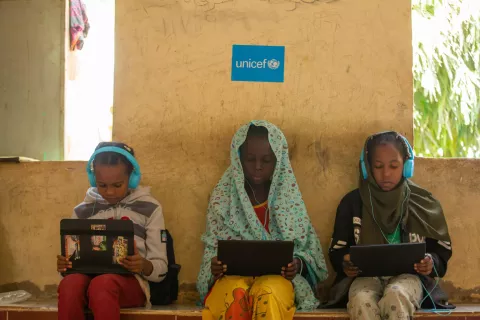Giving up guns to tend goats gives children hope in South Sudan
After leaving an armed group, children are given goats to help realize their dreams
When Simon returns to his family after an arduous time among an armed group, two young goats will help him along his path to recovery, and to realizing his dreams.
PIBOR, South Sudan, 11 February 2016 – His days were once spent on exhausting treks through the bush, armed and poised for danger, never straying far from the commander whose life he was charged with protecting. He had risen through the ranks of Cobra Faction, an armed group caught up in fighting that predates South Sudan’s current conflict, a cook and dishwasher become bodyguard.
Today, from the midst of a scramble for bleating goats Simon* emerges, grinning and triumphant, two of the hardy animals tethered behind him on a leash.
Freedom
Conflict broke out in South Sudan in December 2013. A peace agreement between the government and Cobra Faction was established in May 2014. By January 2015, a fragile peace meant that UNICEF and the National Disarmament, Demobilization and Reintegration Commission could begin demobilizing the estimated 2,000 children in Cobra Faction. By October, 1,755 children had been released.
Learn more about the humanitarian needs of South Sudan
Simon was among the children released from Cobra Faction. In an emotional ceremony, he laid down his gun and removed his uniform for the last time. Just 12 years old**, he had experienced things most adults couldn’t imagine.
Simon spent his first days at a UNICEF interim care centre, where he received medical care, clean water, food and basic household items. This first taste of freedom was joyous, he recalls, as he and the other boys reclaimed their childhood. “We were just talking and playing. We were doing what we wanted,” he says.
Home
Simon then returned home to his family.
His father was overcome, having feared for Simon’s life all the time he had been gone. He vowed never to let him be recruited again. Despite the cost, he wants all of his young children, girls and boys, to go to school.
Simon is happy to be home, far from the beatings, among his loving family, enjoying school, free to dream. “My favourite subject is geography,” he says, stretching his arms in four directions to show the points of a compass. His interest in navigation comes from days and nights moving through the bush as a soldier.
Enter the goats
Goats will play a role in Simon’s re-entry into life with his family. UNICEF is providing the animals to released children like Simon, as well as other vulnerable children in the community. The goal is to help the children of Pibor realize their dreams.
Simon has plans for his goats. “I will look after them and I will care for them,” he says, flushed with excitement, and his tussle with the animals. “I will sell the goats one day when they are older so that maybe I can have a small business, or maybe I can pay for school fees so that when I graduate from school, I can buy food.”
Dreams
Simon has dreams for the immediate future – to tend his animals, to go to school – and for later. He wants to be a pilot and fly to the capital city, Juba.
“When I reach Juba, I will go and play football or volleyball, and when it’s Sunday, I will go pray in church,” he says.
The goats will help lay a bridge to get him there.
Children like Simon are recovering from the physical hardships of life as a soldier, haunting memories of violence, a missed education and the loss of friends. For them, these goats are somewhat of a lifeline, a lively diversion that will pay dividends. The rewarding labour of tending them, and the small bit of economic independence the animals will bring, boost the children’s self-confidence – and create the space to dream.
On 12 February, we commemorate the International Day against the Use of Child Soldiers. The UNICEF South Sudan programme for release and reintegration of children associated with armed forces and armed groups is funded by the European Commission – Humanitarian Aid and Civil Protection Department (ECHO).
*Name changed to protect the child’s identity.
**Simon claims to be 17; his father confirms that he is not yet in his teens.



